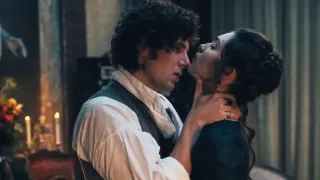September 26, 2017
Noah Simes on 'A Bright Room Called Day'
Kilian Melloy READ TIME: 9 MIN.
By now, dear readers, you will have heard it all: We're heading into capital-F Fascism at reckless high speed with the top down and red-faced, drunken frat boys hanging out the back of the car, hollering like banshees. We're in a place all too comparable to either Weimar-era Germany or the fading days of Rome's democracy... or both. On the most recent episode of "60 Minutes," a panel of both Trump supporters and those who voted otherwise unanimously told Oprah Winfrey that they expect the country to be just as deeply divided come the elections in 2020 -- if not embroiled in outright civil war.
With the present and future so seemingly bleak, does it helps to look back at the past? Does it even help to retreat to the realm of theater, where all such questions have been addressed before now, and where today's playwrights, actors, directors, and designers are forging fresh takes?
Well, yes. Theater -- like literature, like movies -- is a place where we can work the sharp points of reality into hooks and needles, the better to embroider tapestries of narrative testimony. Theater helps us get a clearer glimpse at where it is we might be going, and think about ways to pursue different paths. Boston's theater scene has been quick and specific in pinpointing the ailments and anxieties of the day, starting even before last November's election and continuing even now. These are what that venerable proverb might coyly dub "interesting times," but such interesting times as these electrifies the arts like nothing else.
Case in point: Flat Earth Theater's upcoming production of Tony Kushner's 1987 play "A Bright Room Called Day," which ventures to 1932 Berlin in order to examine the reactions of a group of friends (representing the arts and at least one minority: A painter, a gay man, a movie star are among their number) as Hitler and the Nazis rapidly rise to power. In a parallel story, an American woman in the 1980s struggles with her terror over the idea that the Reagan years represent a similar crisis. As another venerable proverb has it, "This has all happened before; this will all happen again."
Local actor Noah Simes -- who has worked with Boston theater companies as diverse as Imaginary Beasts, Fresh Ink Theatre, Bad Habit, and Flat Earth Theatre itself, in past productions -- plays one of the characters from 1932 Weimar, a fellow called Gregor Bazwald, known to his friends as Baz.
EDGE Caught up to Simes recently for a chat about the play, its reception across the years, and the way that current events have given it fresh new -- and possibly urgent -- meaning.
EDGE: How did you come to be cast in Flat Earth's production of "A Bright Room Called Day?" Had your earlier work with Flat Earth Theatre kind of paved the way - that is, did they remember you from "The Farnsworth Invention" and say, "Hey, he'd be perfect for this!"?
Noah Simes: While that's a flattering thought to entertain, I just auditioned like anyone else! I was familiar with the play, and I felt that it had a kind of stunning amount of resonance with today's social and political situation - it felt like an important production to be a part of at this moment.
EDGE: In "A Bright Room Called Day," you play Baz, a gay man in Germany witnessing the rise of the Nazis. How closely do you feel living in America in 2017 parallels that theatrical experience?
Noah Simes: Honestly, it is arresting how many parallels there are between this play and our current time. Actual political comparisons aside, I see so much about how we're all feeling right now reflected in Tony Kushner's characters. To me, that is the most important thing about this play: It reminds us that this is not the first time these feelings have been felt, and we can learn from the past as we look to the future.
EDGE: Are you drawing on any real life personal angst for your performance?
Noah Simes: Without giving too much away, there's a moment in which Baz's ideals run up against how much of himself he's willing to risk. This scene struck me hard when I first read it - I so identified both with Baz's fear for his personal safety above all else and with his guilt at putting himself before the things he believes in. I think right now it's something a lot of us are struggling with: there is so much evil being enacted in this country - are we doing enough, are we risking enough in the face of fascism? And if we aren't, does that make us complicit? How much should we value our own personal comfort/safety when the stakes are so high? I wish I had answers to any of these questions, but it feels very affirming to see that struggle reflected in this scene written in and about a different time.
EDGE: This is an ensemble piece with ten characters, so it's a fairly large cast. I know that since the election the members of my chorus have taken great solace from a feeling that we're not alone in how we're feeling and responding to the world right now. Are you all feeling some of that?
Noah Simes: Absolutely. I don't want to speak for anyone else, but I know I feel a sense of comfort from having a place to go, not to hide from what's happening in the world, but to channel my feelings about it into something productive, in community with fellow artists. My hope is that this is the feeling we impart to our audiences too: "Yes, it's all overwhelming and scary, but let's harness that, stay grounded, and act in resistance."
EDGE: Earlier productions of this play received mixed reviews in other cities. Does that worry you at all, or seem to worry Dori A. Robinson or the rest of the cast? Do our current circumstances confer a fresh sense of relevance to the play that might have been missing before?
Noah Simes: I don't think we're worried. I'm certainly not. I love the play on its own merits (the language alone is gorgeous) but there is definitely an extra layer to the piece that reveals itself in our current circumstances. There are so many moments that still strike me as startlingly prescient. I think the fact that this play was written in the '80s about the '30s and feels so relevant today says something not only about the darkness of our current times, but also about the universality and truth at the heart of "Bright Room."
EDGE: "A Bright Room Called Day" includes a storyline about a young woman in the 1980s who feels - as do many Americans now - that the Republican-led government of the United States is sliding into fascism. How well does that narrative strand link into our Zeitgeist?
Noah Simes: Honestly, it resonates so well that I suspect we will have some audience members who think we've updated the text to reflect opinions about today's president rather than Ronald Reagan. But it's all original Tony Kushner text, I promise!
What's particularly interesting is that, though Kushner was writing in the midst of this experience, we now have the benefit of hindsight. So we're looking at scenes taking place in 1930s Germany and scenes in 1980s America, and we know that one of these turned into the worst-case scenario we imagine and one didn't. But by placing them side by side, and comparing them to today, we become hyperaware of the threat of fascism, regardless of what ends up happening.
EDGE: There are ghosts and other odd elements to this play, which is not unusual for Kushner. How would you characterize his work? Does Kushner deal in magical realism?
Noah Simes: Oh, definitely. His artful inclusion of otherworldly, magical elements is one of my favorite things about his writing. And I think that when you're dealing in themes as epic as the ones Kushner tends to be interested in, you need that unreal element in order to reach the heights and depths you're aiming for.
EDGE: Speaking of magical realism... I've seen your work with Imaginary Beasts, and remember "Knock!" as being one of the most puzzling, intriguing, energetic productions I've had the pleasure to watch. Are you particularly attracted to dense/satirical/socially conscious material?
Noah Simes: I loved working on "Knock!" so much. It's definitely important to me that I feel that there's an actual reason for the project I'm working on to exist. I'm actually interested almost exclusively in theater that breaks with reality in some significant way. Theater is live, immediate, and therefore constrained by the limitations of the space it's in - no CGI available - so when you can make magic happen, it really feels like magic. And personally, I find the search for magic is the greatest draw of the arts. That's why I keep returning to work with the Beasts; the work they're doing is some of the most creative (and most unconstrained-by-reality) in Boston.
EDGE: Among your other theatrical projects, you act in "Shit-Faced Shakespeare" productions. What's it like to be acting while drunk (assuming that from time to time you are the intoxicated cast member)? Is it freeing? Do you find yourself struggling to keep it together? Or are there maybe moments of great serendipity that arise from the combination of acting and drink?
Noah Simes: It's a bit of a tightrope walk! There are moments of feeling overwhelmed, and there are moments of serendipity (and fortunately no one expects the drunk actor to "keep it together" in any traditional sense of the phrase). But the company does such a good job of supporting their drunk actor each show; there is a regulated amount of time for drinking (slowly, and under the watchful eye of another cast member) prior to the show, and the entire sober cast is well trained to respond to the drunk actor onstage and tend to their needs offstage. And it's that knife's edge, the sense of danger and that occasional brilliant moment where everything comes together, that makes the show such a draw.
EDGE: You're a director as well as an actor, which seems to be a pretty common dual skill set. Do you find you often use the exact same tools and talents for both tasks?
Noah Simes: Mostly I find that there are skills that are uniquely required for each role but that will also make you better at the other. That is to say, I think that being a director can make you a better actor, and vice versa. My brain more naturally tends to "think like a director," which can sometimes be a boon and sometimes an obstacle. I'm always thinking of the bigger picture when sometimes it pays for as an actor to let go of that and be more present in the moment. But I definitely find that the directors and actors I work with most easily have that dual perspective; it allows us to meet each other halfway in discussing the work.
EDGE: Your bio mentions you are part of an "audio drama" called "The Penumbra Podcast"... can you tell our readers a bit about this?
Noah Simes: Gladly! "The Penumbra Podcast" started as a "Twilight Zone"-like anthology series of short genre stories. Since then, it has morphed into more of a serial format, with two concurrent unrelated storylines: A queer sci-fi noir story about a bisexual P.I. on Mars, and an adventure story about monster-slaying knights living in the remnants of a jungle-based civilization. Our goal is to tell new stories using familiar elements and for queer and gender non-binary people to be able to see themselves in genre stories that haven't traditionally included them. We're approaching our mid-second season finale, so now is a great time to start listening and get caught up!
EDGE: Is voice acting a large part of your work, or would you like it to be?
Noah Simes: "The Penumbra Podcast" has been my first big voice acting project, but I'm definitely interested in expanding its role in the work I'm doing. I'm particularly interested in a kind of storytelling that blurs the line between monologue, standup comedy, and campfire tale. I actually think about good storytelling in similar terms to how I think about highly physical acting; it's all about shaping the story you're telling, creating or breaking the flow, moments of tension and release, whether you're using the body or the voice.
EDGE: What other projects have you got going on or coming up?
Noah Simes: I continue to work with both Shit-Faced Shakespeare and The Penumbra Podcast, and in the winter I'll be joining the Imaginary Beasts again for their annual Winter Panto (and this year it's "20,000 Leagues Under the Sea" - not to be missed!). I have a couple of other projects of my own floating around in my head, but they're barely full-fledged ideas yet, so, for now, they'll have to remain there.
"A Bright Room Called Day" runs Sept. 230 - October 14 at the Mosesian Center for the Arts in Watertown. Tickets and more information available at https://www.flatearththeatre.com/shows/season-12/bright-room






